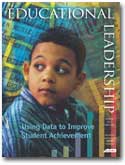September 2003
Building Classroom Relationships
This issue will address strategies for creating democratic classrooms, teaching emotional intelligence, organizing time and groups, offering incentives or sanctions, and meeting the needs of diverse student populations. What are the best practices for improving student-teacher relationships? How do students' differences in ability, learning style, culture, age, and gender affect their motivation and behavior? How are schools assessing the effectiveness of behavior management strategies? How can teachers manage classrooms with a human touch?
Deadline: April 1, 2003
October 2003
Teaching All Students
With the reauthorization of the Individuals with Disabilities Education Act, schools are reexamining how to serve the needs of all students. How are schools diagnosing learning problems and offering interventions for students who are not responding to instruction? How are schools working with and assessing students with special needs, including those with physical and emotional handicaps, attention deficit disorder, or learning disabilities; gifted students; and English-language learners? When is it best to provide noninclusive instruction? This issue will also explore how families, aides, special educators, tutors, and others enhance every student's learning potential.
Deadline: May 1, 2003
November 2003
Responding to the Challenges of Accountability
Many educators fear that the testing and accountability movement may be narrowing the curriculum and inhibiting creative teaching. How are educators meeting accountability standards and engaging diverse students in active, meaningful learning? How are school leaders meeting other challenges of accountability (assessing student progress; aligning curriculum and assessments; evaluating programs; redesigning professional development; measuring school performance; responding to the requirements of the No Child Left Behind Act)? Share lessons about approaches to school reform and how to ensure that each student makes “adequate yearly progress.”
Deadline: June 1, 2003
December 2003/January 2004
New Needs, New Curriculum
Articles in this issue will explore the curriculum areas that are essential for graduates in the 21st century (for example, information literacy; international studies; second languages; the humanities; technology; economics; career exploration; and environmental science). What skills and personal qualities do students need (for example, critical thinking and problem-solving skills; emotional intelligence; teamwork; ethics; and oral, written, and visual communication)? We welcome articles describing new kinds of courses and experiences that schools are offering to better prepare students for their futures.
Deadline: July 1, 2003
February 2004
Improving Achievement in Math and Science
The mapping of the genome has transformed science; computers have revolutionized math class; and neuroscience has altered our understanding of how we learn. This issue will explore math and science literacy, the controversies in choosing content, and issues of equity and standards. We welcome articles on how to teach and assess inquiry-based and group learning; how technology can enhance instruction; how to integrate math and science with other disciplines; and how to motivate female and minority students to excel in these disciplines.
Deadline: September 1, 2003
March 2004
What Research Says About Reading
This issue will explore the connection of research to reading instruction and assessment. What do research and experience tell us about effective ways to prevent language difficulties and overcome obstacles that students face when they learn to read? How much time and what kind of instruction are needed for developing phonemic awareness, oral language, writing skills, vocabulary building, metacognitive strategies, and reading comprehension? What kinds of instruction are needed for ESL students, students with disabilities, and above-average students?
Deadline: October 1, 2003
April 2004
Leading in Tough Times
More and more, leaders are expected to reform the school system while taking on unfamiliar tasks and confronting issues for which they have not been trained. Leaders are also often expected to provide the moral center that infuses the school community. How can they create a consensus on purpose and practice? How can they preserve morale and enthusiasm and create and sustain learning communities? How can they find time for leadership? How do teachers become school leaders and decision makers? This issue will explore the ways in which leadership can emerge in times of crisis and adversity, and how such experiences can help everyone learn and grow.
Deadline: November 1, 2003
May 2004
Schools as Learning Communities
This issue explores how educators, paraprofessionals, students, parents, and community members can engage in shared learning. Suggested topics are in-house professional development; mentoring programs; peer groups for students and adults; strategies for helping new and substitute teachers; ways for teachers and parents to communicate; and ways to build the time, structure, and culture conducive to meaningful learning. How can parents and businesses contribute to the learning life of the school? Tell us about your community-building activities.
Deadline: December 1, 2003

